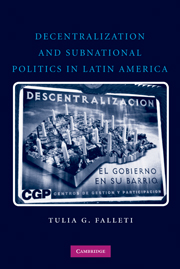Book contents
- Frontmatter
- Contents
- List of Tables
- List of Figures
- Acknowledgments
- List of Abbreviations
- 1 Decentralization and the Revival of Subnational Politics
- 2 A Sequential Theory of Decentralization and the Intergovernmental Balance of Power
- 3 Argentina
- 4 Colombia
- 5 Brazil
- 6 Mexico
- 7 Conclusion
- Bibliography
- Appendix: List of In-Depth Interviews
- Index
4 - Colombia
The Subnational Dominance Path to Decentralization in a Unitary Country
Published online by Cambridge University Press: 05 June 2012
- Frontmatter
- Contents
- List of Tables
- List of Figures
- Acknowledgments
- List of Abbreviations
- 1 Decentralization and the Revival of Subnational Politics
- 2 A Sequential Theory of Decentralization and the Intergovernmental Balance of Power
- 3 Argentina
- 4 Colombia
- 5 Brazil
- 6 Mexico
- 7 Conclusion
- Bibliography
- Appendix: List of In-Depth Interviews
- Index
Summary
In terms of its political regime, Colombia is one of the most stable countries in Latin America. Unlike its neighbors, Colombia has not experienced military rule. The two main parties, the Liberal Party and the Conservative Party, have alternated in power for more than a century, and with the exception of La Violencia (1949–1958) period, Colombian presidents have fulfilled their four-year terms almost without interruption. However, because guerrilla groups, drug lords, and paramilitary groups dispute the state's control over extensive parts of the national territory, Colombia does not even meet the minimalist Weberian definition of a state as “a human community that (successfully) claims the monopoly of the legitimate use of physical force within a given territory” (Weber 1946 [1919], 78).
Both geography and politics have contributed to make Colombia one of the least integrated countries in Latin America. Geographically, three parallel mountain ranges run along the territory from southwest to north and divide the country into three distinctive regions: East, West, and the Caribbean Coast. This topography makes land transportation and communications extremely difficult and has led to a distinctive pattern of urban development in the countryside where each city (such as Medellín, Cali, and Barranquilla) is practically a self-contained enclave. Politically, Colombia's history since the breakdown of the Great Colombia Confederation in 1831 (which encompassed the territories of what is today Colombia, Venezuela, Ecuador, and Panama) has been punctuated by civil wars (1840–1842, 1854, 1859–1863, 1899–1903, 1948–1958, and from circa 1966 until the present).
- Type
- Chapter
- Information
- Decentralization and Subnational Politics in Latin America , pp. 122 - 149Publisher: Cambridge University PressPrint publication year: 2010
- 1
- Cited by



